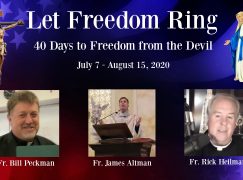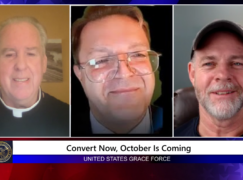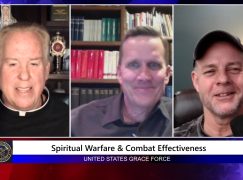

Day 6 – 90 Days to Peace
“Freedom from Vengeance” by Fr. James Altman
Dear family, vengeance sounds a whole lot like revenge to me, both of which we know in our hearts are not good things. One site tried to explain the difference: “the difference between revenge and vengeance is that revenge is any form of personal retaliatory action against an individual, institution, or group for some perceived harm or injustice while vengeance is revenge taken for an insult, injury, or other wrong.” Well, that was no help! They still sound like the same thing. Sure enough, another site called the words synonyms.
In any event, this we know: “Vengeance is Mine, saith the Lord” (Deuteronomy 32:35). The truth in Deuteronomy is found in the words of St. Paul, “Beloved, do not look for revenge but leave room for the wrath; for it is written, ‘Vengeance is mine, I will repay,’ says the Lord” (Romans 12:19). When the Word became Flesh and dwelt among us, He confirmed it all, teaching: “You have heard that it was said, ‘An eye for an eye and a tooth for a tooth.’ But I say to you, offer no resistance to one who is evil. When someone strikes you on (your) right cheek, turn the other one to him as well” (Matthew 5:38-39).
What does “offer no resistance to one who is evil” mean exactly? In our day and age, this is an important question that is, unfortunately, too often answered with a glib and meaningless recitation of “turn the other cheek.” This response though is a disconnected scriptural verse, taken out of context, out of culture, and out of text written about 2,000 years ago in a language that few people understand.
Let us begin with what Matthew 5:38-39 really means. The biblical notes to those two verses state: “The Old Testament commandment was meant to moderate vengeance; the punishment should not exceed the injury done. Jesus forbids even this proportionate retaliation.” Right away then, we see this only pertains to the concept of retaliation. It did not mean then, and it does not mean now, that we simply lay down and play “doormat” for any evil doer.
This “I’m not a doormat” principle may be explained best by considering self-defense. We are entitled to protect our own lives and the lives of others. This right is not negated by Jesus’ teachings, and in fact, it stands in contrast to the scriptural admonition against retaliation. The warning against retaliation may be understood by pondering one of its consequences: escalation. For example, one bad actor “A” incites retaliation from “B”, which incites retaliation from “A”, which incites more retaliation from “B”, etc. This vengeance cycle can escalate to the point where others end up getting caught in the crossfire. In the real world this results in bodies in the streets of our cities, and innocent victims (too often little children) reaping the repercussions.
In a larger sense, who can deny that the current culture of violence, rioting, looting, and burning is nothing other than vengeance and retaliation? The anarchists set themselves up against Christian truth, truth found in the words of the great prophet Jeremiah: “To whom shall I speak? Whom shall I warn and be heard? … See, the word of the LORD has become for them an object of scorn, for which they have no taste” (Jeremiah 6:10). It explains why the Seattle mayor’s absurd response to CHOP (the Capitol Hill Organized Protest) seems to prevail everywhere – remember she called it “the summer of love.” We saw the “love” in the murders and violent crimes. Her perverse twisting of truth also is found in the words of Jeremiah: “They have treated lightly the injury to my people: ‘Peace, peace!’ they say, though there is no peace” (Jeremiah 6:14).
In a more personal sense, all that we are seeing is nothing other than a reflection of people’s hearts devoid of the tempering grace of Divine Love. Divine Love did not rain down lightning bolts upon the Roman centurions who drove the nails into His sacred body. Rather, Jesus sought to show Divine Love when He asked our Father to forgive them, for they knew not what they did (cf. Luke 23:34).
Let us realize, though, that Jesus did not paint with a broad brush of forgiveness to include those who knew what they were doing, or those who should have known. That is why Jesus said the members of the Sanhedrin who condemned Him would not enter the Kingdom of Heaven (cf. Matthew 5:20). That is why God’s justice will have its day when the lack of love drives so many to act in a vengeful way.
Again, the opposite of vengeance is love. But love is not demonstrated by playing “doormat.” In the face of evil, genuine love is known as “tough love.” True love speaks up and speaks out with courage, in the face of grave error that threatens real peace. True love is enshrined in the spiritual works of mercy that teach us to instruct the ignorant and admonish the sinner. Instruction and admonishment are correction, they are not the same as vengeance or retaliation.
In these dark times, let us not fall into the trap of a false mercy, some twisted interpretation of “turning the other cheek.” Rather let us be a Light of Christ and an example of genuine love that instructs the ignorant and admonishes the sinner. Amidst all the vengeance we see in the streets, and in the personal hurts in our own lives, we will have plenty of opportunity to do that. So, any time we find ourselves struggling with thoughts of vengeance instead of mercy, let us make haste to spend more time before the Blessed Sacrament, meditating upon the Holy Cross, where the Light of Christ enlightens the darkest thoughts of our own souls.
You can enlist in the United States Grace Force HERE (please recruit family and friends!)
Information on the United States Grace Force can be found HERE
We highly recommend ordering the book (recently published), authored by Fr. Bill Peckman, Fr. James Altman and Fr. Rick Heilman. This amazing book will be a great tool for easy access, highlighting and bookmarking as you traverse through this 40-day challenge with tens of thousands of other special forces prayer warriors!
You can order the book at RomanCatholicGear.com.
GET YOUR PEACE THROUGH STRENGTH PRAYER JOURNAL …
HERE









